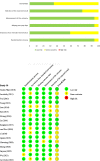Effects of Tai Chi and Qigong on cognitive and physical functions in older adults: systematic review, meta-analysis, and meta-regression of randomized clinical trials
- PMID: 37280512
- PMCID: PMC10242998
- DOI: 10.1186/s12877-023-04070-2
Effects of Tai Chi and Qigong on cognitive and physical functions in older adults: systematic review, meta-analysis, and meta-regression of randomized clinical trials
Abstract
Background: Older adults experience age-related declines in physical and cognitive functions due to interactions between aging and chronic diseases. Tai Chi and Qigong (TCQ) might be beneficial in improving the physical function and delaying the cognitive decline of this population. The potential underlying mechanism was explored to determine the effects of TCQ on cognitive function via direct or indirect pathways.
Purpose: The objective of this systematic review was to determine the effects of TCQ on cognitive and physical functions in older adults using meta-analysis, and to determine the impact of TCQ on cognitive function while controlling for physical function using a meta-regression approach.
Methods: A systematic search of 13 electronic databases (in English, Korean, and Chinese languages) identified 10,292 potentially eligible studies published between inception and May 2022. The bias in individual studies was assessed using the Cochrane Risk of Bias (version 2.0) tool. The heterogeneity of the studies was evaluated using a 95% prediction interval, and the meta-analysis and meta-regression were implemented using the Comprehensive Meta-Analysis (version 3) software.
Results: Our search identified 17 randomized studies (n = 2,365, mean age = 70.3 years). The results of the meta-analysis that used a random-effects model indicated that TCQ had significant effects on both cognitive (Hedges' g = 0.29, 95% confidence interval [CI] = 0.17 to 0.42) and physical (Hedges' g = 0.32, 95% CI = 0.19 to 0.44) functions. We used meta-regression to explore the effect size of TCQ in association with physical function level. The regression model was significant (Q = 25.01, p = .070), and 55% of the heterogeneity was explained by physical function as a moderator variable. The effects of TCQ on cognitive function remained significant in this model when controlling for the effect of physical function (β = 0.46, p = .011).
Conclusion: This meta-regression of 17 randomized studies strongly suggests that TCQ has beneficial effects on physical and cognitive functions in older adults. The effect of TCQ on cognitive function remained significant after taking into account the significant effects of physical function as a moderator. The findings imply the potential health benefits of TCQ by promoting cognitive function in older adults directly and indirectly through enhancing physical function. PROSPERO REGISTRATION NUMBER: *PROSPERO international prospective register of systematic reviews, registration ID CRD42023394358.
Keywords: Cognitive function; Meta-analysis; Meta-regression; Older adults; Physical function; Tai Chi and Qigong.
© 2023. The Author(s).
Conflict of interest statement
The authors declare no competing interests.
Figures




Similar articles
-
Effects of Tai Chi and Qigong on physical function and psychiatric symptoms among individuals with mental illness: a systematic review and meta-analysis of randomized controlled trials.Ann Behav Med. 2025 Jan 4;59(1):kaaf019. doi: 10.1093/abm/kaaf019. Ann Behav Med. 2025. PMID: 40165437
-
Tai Chi and Qigong for cancer-related symptoms and quality of life: a systematic review and meta-analysis.J Cancer Surviv. 2018 Apr;12(2):256-267. doi: 10.1007/s11764-017-0665-5. Epub 2017 Dec 8. J Cancer Surviv. 2018. PMID: 29222705 Free PMC article.
-
Effects of Tai Chi and Qigong on the mobility of stroke survivors: A systematic review and meta-analysis of randomized trials.PLoS One. 2022 Nov 17;17(11):e0277541. doi: 10.1371/journal.pone.0277541. eCollection 2022. PLoS One. 2022. PMID: 36395145 Free PMC article.
-
Evaluation of the sustaining effects of Tai Chi Qigong in the sixth month in promoting psychosocial health in COPD patients: a single-blind, randomized controlled trial.ScientificWorldJournal. 2013 Oct 24;2013:425082. doi: 10.1155/2013/425082. eCollection 2013. ScientificWorldJournal. 2013. PMID: 24282383 Free PMC article. Clinical Trial.
-
Tai chi qigong as a means to improve night-time sleep quality among older adults with cognitive impairment: a pilot randomized controlled trial.Clin Interv Aging. 2016 Sep 16;11:1277-1286. doi: 10.2147/CIA.S111927. eCollection 2016. Clin Interv Aging. 2016. PMID: 27698557 Free PMC article. Clinical Trial.
Cited by
-
Project HERO: a randomized trial of Tai Chi qigong versus intensity-matched exercise and usual care for fatigue in older male cancer survivors.BMC Complement Med Ther. 2025 Jul 4;25(1):239. doi: 10.1186/s12906-025-04988-7. BMC Complement Med Ther. 2025. PMID: 40616105 Free PMC article. Clinical Trial.
-
Effectiveness of Tai Chi exercise on balance, falls, and motor function in older adults: a meta-analysis.Front Med (Lausanne). 2024 Nov 5;11:1486746. doi: 10.3389/fmed.2024.1486746. eCollection 2024. Front Med (Lausanne). 2024. PMID: 39564508 Free PMC article.
-
Effect of Tai Ji and/or Qigong on patients with stable chronic obstructive pulmonary disease: A meta-analysis and systematic review.Medicine (Baltimore). 2025 Jan 31;104(5):e41390. doi: 10.1097/MD.0000000000041390. Medicine (Baltimore). 2025. PMID: 39889182 Free PMC article.
-
A meta-analysis of the influence of traditional Chinese exercises on cognitive function in the elderly.Front Psychol. 2025 Apr 8;16:1516197. doi: 10.3389/fpsyg.2025.1516197. eCollection 2025. Front Psychol. 2025. PMID: 40265005 Free PMC article.
-
Effects of Tai Chi Chuan on cognitive function in adults 60 years or older with mild cognitive impairment: a systematic review and meta-analysis.Front Physiol. 2025 Apr 1;16:1556622. doi: 10.3389/fphys.2025.1556622. eCollection 2025. Front Physiol. 2025. PMID: 40236822 Free PMC article.
References
-
- Cooper R, Hardy R, Aihie Sayer A, Ben-Shlomo Y, Birnie K, Cooper C, Craig L, Deary IJ, Demakakos P, Gallacher J. Age and gender differences in physical capability levels from mid-life onwards: the harmonisation and meta-analysis of data from eight UK cohort studies. PLoS ONE. 2011;6(11):e27899. doi: 10.1371/journal.pone.0027899. - DOI - PMC - PubMed
Publication types
MeSH terms
LinkOut - more resources
Full Text Sources

